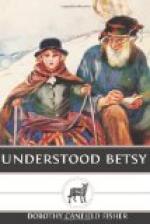“They don’t see many strangers,” the teacher explained, “and they feel very shy and scared when a new scholar comes, especially one from the city.”
“Is this my grade?” asked Elizabeth, thinking it the very smallest grade she had ever seen.
“This is the whole school,” said the teacher. “There are only two or three in each class. You’ll probably have three in yours. Miss Ann said you were in the third grade. There, that’s your seat.”
Elizabeth sat down before a very old desk, much battered and hacked up with knife marks. There was a big H. P. carved just over the inkwell, and many other initials scattered all over the top.
The teacher stepped back to her desk and took up a violin that lay there. “Now, children, we’ll begin the afternoon session by singing ‘America,’” she said. She played the air over a little very sweetly and stirringly, and then as the children stood up she came down close to them, standing just in front of Betsy. She drew the bow across the strings in a big chord, and said, “Now,” and Betsy burst into song with the others. The sun came in the windows brightly, the teacher, too, sang as she played, and all the children, even the littlest ones, opened their mouths wide and sang lustily.
CHAPTER V
What grade is Betsy?
After the singing the teacher gave Elizabeth Ann a pile of schoolbooks, some paper, some pencils, and a pen, and told her to set her desk in order. There were more initials carved inside, another big H. P. with a little A. P. under it. What a lot of children must have sat there, thought the little girl as she arranged her books and papers. As she shut down the lid the teacher finished giving some instructions to three or four little ones and said, “Betsy and Ralph and Ellen, bring your reading books up here.”
Betsy sighed, took out her third-grade reader, and went with the other two up to the battered old bench near the teacher’s desk. She knew all about reading lessons and she hated them, although she loved to read. But reading lessons ... ! You sat with your book open at some reading that you could do with your eyes shut, it was so easy, and you waited and waited and waited while your classmates slowly stumbled along, reading aloud a sentence or two apiece, until your turn came to stand up and read your sentence or two, which by that time sounded just like nonsense because you’d read it over and over so many times to yourself before your chance came. And often you didn’t even have a chance to do that, because the teacher didn’t have time to get around to you at all, and you closed your book and put it back in your desk without having opened your mouth. Reading was one thing Elizabeth Ann had learned to do very well indeed, but she had learned it all by herself at home from much reading to herself. Aunt Frances had kept her well supplied with children’s books from the nearest public library. She often read three a week—very different, that, from a sentence or two once or twice a week.




